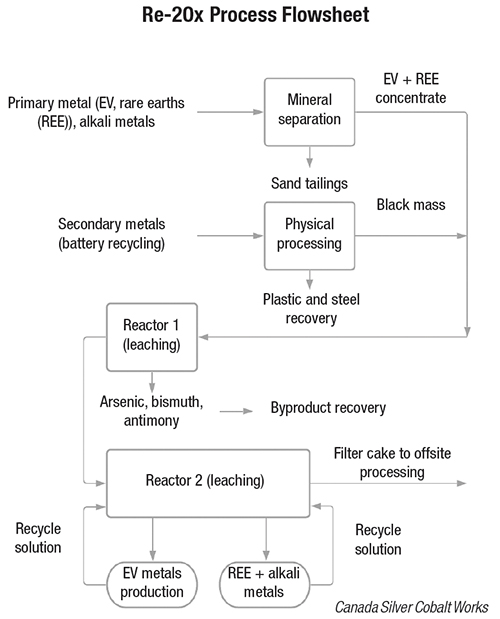 A proprietary hydrometallurgical process known as Re-2Ox —originally conceived for the production of high-grade cobalt sulfate from mineral resources — is now showing promise in the field of battery recycling. “We did some preliminary test work and the technology was amenable to batteries. The intent is to process not just primary feed, but also secondary feed, which is all the different battery products, including lithium ion, nickel cadmium and nickel hydride. We take all these secondary feeds and break down the batteries into usable materials,” explains Frank Basa, CEO of Canada Silver Cobalt Works Inc. (Coquitlam, B.C., Canada; www.canadasilvercobaltworks.com).
A proprietary hydrometallurgical process known as Re-2Ox —originally conceived for the production of high-grade cobalt sulfate from mineral resources — is now showing promise in the field of battery recycling. “We did some preliminary test work and the technology was amenable to batteries. The intent is to process not just primary feed, but also secondary feed, which is all the different battery products, including lithium ion, nickel cadmium and nickel hydride. We take all these secondary feeds and break down the batteries into usable materials,” explains Frank Basa, CEO of Canada Silver Cobalt Works Inc. (Coquitlam, B.C., Canada; www.canadasilvercobaltworks.com).
The basis for Re-2Ox is an acid-leaching process that is both zero-discharge and potentially carbon-neutral, adds Basa, noting that the Re-2Ox pilot program being run at SGS Canada’s Lakefield location runs on solar and hydroelectric power. The company is planning to continue building out the current pilot program and construct a dedicated pilot plant in northern Ontario, which will become the first hydrometallurgical battery-recycling facility in North America.
What sets the Re-2Ox process apart is its versatility to match a wide variety of secondary battery feedstocks with customized end-product requirements. “Typically, we start with two months of testing to see what builds up in these recycled streams, since the batteries we process are not all consistent,” explains Basa. To eliminate process waste, the company tries to ensure that it can make use of all components that are present in the battery feeds they receive, from arsenic to rare-earth metals to organic compounds. “We are currently working with a large recycler that is interested in mainly recovering rare-earths from a largely nickel-hydride-based feed. We have a modified reactor with a special accumulator for rare-earths, which we are recovering as a bulk product to be sent elsewhere for further processing,” adds Basa.